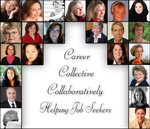By Jacqui Barrett-Poindexter

Career change is not only possible, it is probable if you bear in mind certain rules of thumb and realities and consider your career change process an adventure involving new learnings, personal sacrifices and opportunities for exhilaration. As well, as in ANY change, the most effective and manageable transition involves charting a course.
I wrote about such career change navigation, HERE. As well, sometimes we are slammed by a job-loss or life-change surprise, in which case we must regain our footing and rebuild in less than ideal conditions. I wrote about my personal experiences, HERE.
This month’s Career Collective focuses on Best Advice for Career Changers and includes posts from more than a dozen other career bloggers. My colleague, Miriam Salpeter, and I enjoy facilitating this monthly event and hope you will follow our colleagues’ tweets via the hashtag, #CareerCollective.
To Begin, Some Rules of Thumb
- Although there are exceptions to every rule (and this article is focused on rules of thumb versus those rare exceptions), do not expect career change to be a 1-2 punch. It may be a series of stair steps to move you up and out of your current career situation. It may even be that you step backward a bit, then sideways before moving ahead.
- You must rely on your initiative in researching opportunities and knitting a story that maps to those opportunities. It must be crystal clear to the hiring decision maker that you would hit the ground running in providing value.
- You must apply patience, and rigor in understanding target companies’ unique areas of need, then patiently parse through your career details and pull out the stories within the stories that will matter, going forward. (A little help from a career resume strategist can help this process be more invigorating, less confusing and more results focused!) It is YOUR job, not those hiring, to figure out how you fit their needs. It is YOUR job, not theirs to convince beyond a shadow of a doubt why and how you make sense in their hiring decision (beyond just: I know I can do it because I am a real People Person!)
- While submitting your current career story to job boards generally is a shotgun approach under normal circumstances, when changing careers, this approach particularly will fail. As well, recruiters, though an excellent resource in career propulsion, probably are not your go-to resources if you are switching careers. It is not their job to convince a hiring decision-maker that your ‘transferable skills’ will meet their needs.
- That said, if chronicled strategically, your ‘transferable’ skills and experience will read as if they are square-peg to square-hole fitting and will compel the right reader and hiring decision-leader that you can quell their aching bottom line through the flip of a career switch.
- Career change can be fun if you are confident, clear about your goals, open to adventure, willing to be flexible and enticed by the idea that your goals may evolve through the career change path.
Now, let me share a story or two about career changers with whom I’ve worked when embarking on their career turn:

Jack(ie) of All Trades and Master of None?
As careerists enter my virtual door, the oft-touted message is that they are masters of many, many different career areas. Quite frankly, there is some truth to that as my senior-level clients have risen through the ranks through challenges involving human resources, administration, general management, operations, sales, marketing, finance, technology and the like.
It is natural for them to espouse an ability to shift-change, adapt and succeed in whatever role or challenge in which they are parachuted!
Sometimes, inspired by burnout in their current role, frustration with their present colleagues and co-executives and/or simple curiosity, leaders will assert their strong desire to change careers. They aspire to a role that emphasizes career muscles they may have flexed five, 10 or even 15 years ago, but may have withered a bit in recent years. Or, even, they may decide they aspire to something wholly different than they’ve ever done.
Often, despite these challenges, with introspection, career changers can bring to light valuable career anecdotes that sell a reader that they are a necessary interview candidate for the opportunity that is burning a hole in the target company’s career pocket.
Shine a Light on Key Messages
Bring the critical messages to light – reveal your career wins that relate to your target goal. Identify those stories that may be buried in the recesses of your mind. Paint them with bright word colors that exude your passion for the business bottom line, for the executives and customers with whom you engage and for the absolute betterment of the company’s market share, positioning and sustainability.
For example, I had a recent client – we’ll call him Jim — whose longstanding career proved he had blazed an account management leadership and profit success trail across a plethora of financial institutions including the now-tarnished sub-prime lender arena. His record was peppered with financial results, but the industry upon which his track record was built was crumbling beneath his feet. He set out to pave a new career specialty after more than 12 consecutive years in the same trade.
Be Willing to Take on a Career Change Bridge Role
When this client approached me to rewrite his resume, he was not only surviving, but thriving in a ‘bridge’ sales management role that he had taken for the past 1.5 years to initially transition industries. This transportation (motorcycle) product sales role cued in on his exceptional strengths in fast-track learning, innovation in finding new markets, implementing new sales techniques and creating new market presence through collaboration with marketing and relationships with channel partners.
Further, he showed, through vivid word pictures how he generated double-digit growth in a down-trending and historically unproductive territory donning the same talent wings that helped him soar in his prior industry.
Moreover, after deliberating about what his future goals were, he zeroed in on a Senior Business Development and Sales Management role selling tangible products. Note: the lions share of his career had been marketing intangible, financial services, but with a bridge role under his belt that demonstrated his prowess in selling tangible products and a deep, concerted and confident approach to moving ahead in a different industry, Jim proved, in short order, that he could add relevant, revenue-focused value in an industry and product relatively new to him.

Focus on the Right Audience
In his next, transitional search, Jim didn’t focus on insisting to square-peg, square-hole-centered recruiters that he was the right fit for their very specific requirements; instead, he focused on new shoots of green by directly contacting key decision-makers in companies exhibiting signs of growth and rebirth. As such, after his successful landing, he shared with me that he had noticed a local company that had broken ground for new construction.
The long and short of it is he wrote the owner an introductory note that spurred an interview, resume presentation and ultimately, a job offer. Rather than shot-gunning his resume to job postings and recruiters where his resume, not quite the square-peg candidate, would get shuffled into the trash bin, Jim researched companies and actively pursued those that had an imminent need for what he had to offer.
What Jim Did Right:
- Didn’t center his communication efforts on recruiters. Though a recruiter may believe you can do the job, his job is not to convince HIS boss (the hiring company) that, even though you have absolutely ZERO experience selling ABC widget, medical devices, technology solutions, or some other specialty product that you are the perfect fit.
- Instead, Jim took stock of his unique value, created a story-board set of career documents from which he could tap during conversations and which he could present in written form (resume). These resume documents spoke to why HE was the perfect fit for a hurting business owner, executive, manager or other hiring decision-maker.
- When writing his career positioning documents, he converted financial services industry language into the language of his target audience, amending his story to resonate with new listeners, outside his familiar industry arena. This strategic marketing initiative created a nuanced, focused resume that looked and sounded dramatically different from his prior career industry marketing documents.
- He also bore in mind that what may have been important message points on his former resume may be left on the cutting room floor, going forward. As such, career changers MUST be ready to tame their ambition to magnify stories that once mattered in their ‘old’ career and humbly bear in mind the NEW audience’s needs. This made a striking difference; instead of writing a play about HIMSELF, he wrote a career production about THEM, where HE was the leading character.
- He looked at small- and medium-sized companies, where the willingness to hire less-than-perfect-fit candidates is more likely than with often ‘less nimble’ larger companies.
Other Advice for Career Changers:
- Clearly, if you are missing the precise experience or skills that the hiring decision-maker is seeking, then seek out experience through classwork, training, volunteer channels and more to fill the gap.
- For example, I recently worked with an operations and procurement client with a multiplicity of marketing skills that will support her transition into the marketing arena. However, most of the jobs she sought were higher level marketing roles requiring a much deeper level of experience and niche areas of prowess than she offered; e.g., specific experience and results in social media marketing, where she had none; specific experience and results in SEO, where she had none; product positioning; direct response marketing, etc. – you get the drift.
- Though she had certain elements of marketing under her belt; e.g., working on customer mailing lists; marketing/communication campaigns and strategies; website maintenance; and writing, she was sorely lacking in very key requirements of a well-rounded marketing strategist.
- Her next steps may include upping her activity on social media, gaining personal, day-over-day practice on LinkedIn, Twitter, Facebook and Quora; signing up for training (webinars, classes) regarding social media marketing; and/or volunteering for an association and join a marketing committee that will allow her real experience applying marketing prowess to business needs.
- Her options may also include taking a step down in her career to enter into an entry-level marketing role, if she can afford the salary cut to do so. Or, she may vie for a lateral career switch that taps into her operational/procurement core strengths, yet offers opportunities to continue expanding her marketing arsenal.
- Perhaps, she may seek out opportunities at a mid-size or larger company where the circumstances facilitating career change are more favorable (e.g., a company that encourages career movement), once she is settled in for six months or a year. This type of stair-step change requires the job seeker conduct due diligence to determine which specific companies’ management cultures encourage career movement and growth.

Finally, consider your current role and opportunities at your present company to expand your visibility and value therein. Offer to tackle projects related to your intended goal, creating a win-win for you and the company. In my client’s case, she already was taking the initiative in her company to initiate and pursue marketing-related roles; however, she was at a sticking point spurring her to desire to leave (working for a large, politicized company with leadership and other related barriers to career movement).
However, if you are feeling stuck in your current role, but are happy, overall, with your employer, consider ways you can volunteer to participate in or lead projects related to your target transition goal and start gaining new experience and proving your abilities.
So, get started on the research today to propel your career into the direction YOU desire. Begin online (then take it offline with real live conversations). To support your research goals, following are few resources you may visit to collect valuable insights about target companies.
Get Started on Researching New Companies
- Hoovers.com: to search people and companies (limited “free” information); e.g., for company information, you’ll find address,phone numbers, rankings in FT Global, Fortune 500 and S&P 500.
- Glassdoor: helps employees, job seekers, employers and recruiters find and share detailed information about more than 110,000 companies, such as Facebook, Accenture, AT&T, Oracle, Starbucks and UPS.
- ZoomInfo.com: a business information search engine that provides company search, people search and job search. It constructs profiles on people and companies.
- Manta.com: the largest free source of information on small companies. This is a very cool site that has key information on over 60M companies, allowing you to drill down by industry, by location, by size, etc., and then find a profile (address, phone, website, company contacts) as well as reports; map; and web results (i.e., they do a Google search for you, providing a quick snapshot of search results!).
- Forbes.com: home page for information on the world’s business leaders and includes nine editorial channels on business, technology, markets, personal finance, entrepreneurs, leadership, ForbesLife, opinions and lists.
- Business articles at Bizjournals.com or Wall Street Journal (online.wsj.com).
- LinkedIn: Follow companies and read their profiles and goings-on.
~~~~~~~~~~~~~~~~~~~~
 Here’s what my colleagues are saying:
Here’s what my colleagues are saying:
Are You Ready for a Career Change? @Debra Wheatman
Changing Careers? Ask yourself these questions. @erinkennedycprw
Changing Careers: Not for the Fainthearted, @GayleHoward
Career Change Isn’t An Exact Science, @careersherpa
The 10-Step Plan to Career Change, @KatCareerGal
When it’s Time to Recycle Your Career, @WalterAkana
Best Career Change Advice: Target & Plan, @JobHuntOrg
How social media can help you change careers, @keppie_careers
Expat Careers: You Are Not Your Job Title, @expatcoachmegan
Changing The Direction Of Your Career, @EliteResumes @MartinBuckland
Top 3 + 1 Tips for Making a Successful Career Change, @KCCareerCoach
Changing Careers: Look Before You Leap, @barbarasafani
10 Commandments for Career Changers, @LaurieBerenson
Jacqui, I love this meaty, detail-rich blog entry. There’s a lot to learn from the example of Jim.
I think that professionals with sales experience are more accustomed to seeing possibilities rather than challenges and I think more job seekers need to think about adopting that mindset.
Hi Ed,
Thanks for your kind remarks.
You make a great point about sales professionals being more ‘accustomed to the possibilities.’ I believe we all have it in us to bring out the ‘inner salesperson.’ In fact, even those folks who feel disinclined to self-market, I think, can find ways intuitive to their personalities to sell themselves. (That’s probably another post in and of itself!)
You add such value when you stop by, and I always appreciate it, Ed!
Jacqui
Jacqui,
I think Ed has said it very well. There are a lot of “take homes” here. Something that your readers have come to expect which comes as no surprise given the effort you put into everything you do.
Hello Dave,
“Take homes” <-- I like the sound of that. Thank you very much for your continued advocacy and for believing in me and my work. Jacqui
Great post Jacqui! The detailed career path of real clients offers excellent advice and inspiration to those considering a career change. A definite How To: Do it “write” career post!
Thanks so much, Martin!
I love the phrase, “do it ‘write.’”
I’m sure you have many such client stories in your repertoire, as well.
Have a great day!
Jacqui
As you do so often Jacqui… you nailed it. Great advice!
Wow – that means a lot coming from someone with the breadth of career advisement and recruiting experience as you.
Thank you, Harry!
Jacqui
Jacqui,
You’ve created such a clear picture in my mind of possible paths to navigate the often frightening journey of a career change – its fantastic and I’m sure very anxiety reducing! That and the list of resources make this post a must-read for anyone considering career change.
It’s fantastic to be part of such a wise and insightful group of career experts.
Warmly,
Megan
Hi Megan,
I’m very appreciative of your feedback on the post. The paths to navigate the uncomfortable, often scary journey of career change are many, really, and if in our roles supporting careerists we can help quell their anxiety, I feel we’ve provided a value-add!
Thanks for your meaty blog post contribution, as well! So glad to have your Expat Coach perspective!
Jacqui
Using Jim’s mistakes and what he learned makes this case study really come alive. Rich material here, Jaqui. Your writing vibrates as you describe what this is like. Warmly, Rosalind
Rosalind,
“Writing that vibrates” – love that!
So glad you liked Jim’s example; it’s rewarding to be able to provide client case studies in support of others’ undergoing career change.
Jacqui
Great post, Jacqui! As you so eloquently detailed here, so many career change activities require a self-marketing approach – from research, to social media, to face-to-face meetings. I also like your resource list – very good and mostly free!
Thanks Meg! I appreciate your reinforcing the self-marketing approach to career change — and coming from a ‘marketing expert’ like you, that means a lot!
Best,
Jacqui
Jacqui – As always, a resource-rich post! I love the story angle — it’s so helpful to learn via example. I’m so glad to work together with you on the Career Collective!
Miriam,
Ditto! (re: collaborating on the Career Collective with you!).
So glad you liked the story angle! It’s delightful to have such a rich repository of client stories to tap when fueling blog posts : )
Jacqui
I have found that transitioning careers (job functions) within ones industry is much easier than taking skills and trying to apply them in a different situation.
There seems to be a natural tendency to prefer candidates that have industry experience. Hiring managers do not always thing outside the box to see how skills would be applicable in a new setting. This reminds me of why you need to stage a house when trying to sell it.